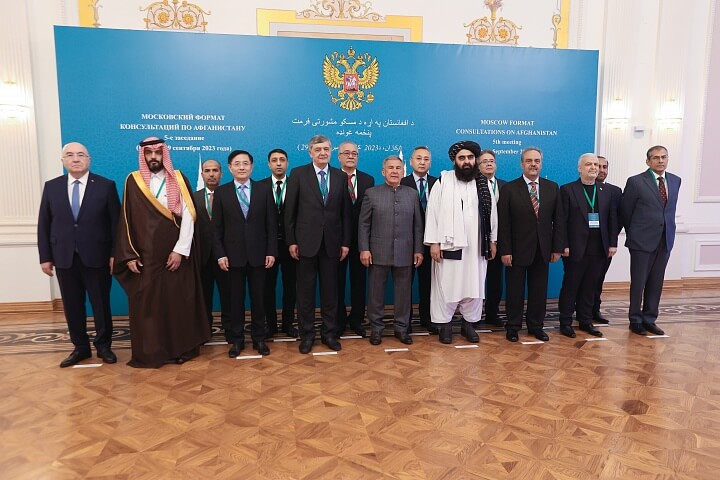The Taliban regime in Afghanistan is on its way to at least partial international recognition after the recent acceptance of its first ambassador to Beijing.
China set a precedent by accepting the credentials of an official Taliban diplomat as the permanent representative of Afghanistan. It is the first country in the world to do so, but it may not be the only one.
Beijing has assessed that it could allow itself a paradoxical situation of not recognising the Taliban government in Kabul as the legitimate government of Afghanistan, like everyone else in the world. However, it accepted its ambassador, which has been the first case so far.
The recognition of the Taliban government will "come naturally at the right time”, the Chinese Ministry of Foreign Affairs stated when receiving the credentials of the first Taliban ambassador in Beijing.
His arrival in Beijing rounded off a diplomatic exchange at the highest level, given that China appointed a new ambassador to Kabul last September, the first since the Taliban seized power more than 2 years ago.
One step closer to full recognition
Beijing abandoned the global consensus according to which the Taliban regime could not have international legitimacy due to its severe violations of human rights, particularly against women.
Given that it de facto already established full diplomatic relations, abstaining from formal recognition of the Taliban government as legitimate is just an excuse for Beijing.
China conditions its formal recognition of the government in Kabul on its fulfilment of expectations of "building an open and inclusive political framework, implementing moderate and prudent domestic and foreign policies, and resolutely combating all kinds of terrorist forces”.
However, these reservations are not as strong as Beijing's belief that Afghanistan "should not be excluded from the international community", stated the Chinese Ministry of Foreign Affairs.
Beijing asserted itself as the only possible way out for the isolated Taliban regime and, in turn, as the biggest exclusive claimant to Afghanistan
The new diplomatic breakthrough with the acceptance of the Taliban ambassador is a significant step in rounding off Chinese influence in Afghanistan after the US withdrawal in 2021.
Beijing then asserted itself as the only possible way out for the isolated Taliban regime and, in turn, as the biggest exclusive claimant to Afghanistan.
China has not applied import tariffs to 98% of goods from Afghanistan since July 2022, which was a concession to the Taliban regime and even more a hint of further opening.
Improving diplomatic relations also means that Beijing accepts assurances from Kabul that it will not encourage extremist movements operating in the western province of Xinjiang.
Also, China positioned itself as a sponsor of Afghanistan's inclusion in regional infrastructure and security structures, primarily towards Pakistan as a joint partner.
These processes will run according to the dynamics and as far as it is in the interest of China, as a regional power that takes the lead in filling the remaining vacuum after the American withdrawal from Afghanistan.
Will Russia follow China?
By exchanging diplomatic representatives, China and Afghanistan have provided scope for other regional governments to follow suit in pursuit of a piece of the "pie" of influence Chinese operations left behind.
Russia has been acting as the first possibility from that circle of states, which could legitimise the Taliban regime, according to the recipe that Beijing has already set.
High Taliban delegations have already been officially received in Russia several times. One of the last was a delegation from Kabul participating in a regional multilateral meeting on the fight against terrorism and drug trafficking in Kazan at the end of September.
 High Taliban delegations have already been officially received in Russia several times
High Taliban delegations have already been officially received in Russia several times
Also, Russia is one of the few countries that handed over the embassy of Afghanistan to Taliban representatives. It did so in April 2022, 2 months after it launched its invasion of Ukraine.
Like China, Russia has no issues with tolerating severe human rights violations by the Taliban regime. At the same time, it has no problem with legitimising the Taliban government, using the Chinese model and not excluding Afghanistan from the international community.
Even though the aggression against Ukraine caused its influence in Central Asia to decrease, Russia still wants to hold some authority over the region, where it has always been traditionally dominant, dating back to the Soviet era.
China has been displacing it as the dominant force, which Moscow cannot effectively oppose and does not want to risk its significant alliances with Beijing.
Moscow still sees a chance of remaining a significant factor in Central Asia. However, it is aware that primarily China will decide on the strength of that presence.
If Russia were the first country after China to give formal diplomatic legitimacy to the Taliban regime, China would view Russia as a reliable partner that keeps pace with its global political manoeuvres.